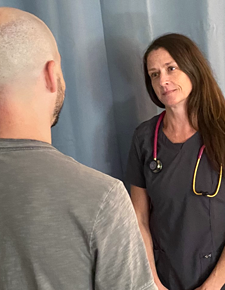AMITA Health
Healthcare Heroes: Tackling the Mental Health Stigma
Stigma (stig·ma), noun. An unfounded association between a risk and a person or group of people.
Why is this word so important to Sara Stoy, RN?

“Stigma is particularly common in disease outbreaks, like the current [COVID-19] pandemic,” the healthcare hero wrote in a May 19 guest column for The Daily Herald. “Stigma is fed by fear, which underlies judgments and bias and propels anxiety and panic.”
Fear was rife in the spring of 2020, when the novel coronavirus turned society on its head. Events were canceled, schools closed and people took to their homes to curb the spread of the infectious disease. Stoy, mental health nurse at AMITA Health Center for Mental Health in Arlington Heights, saw an uptick in anxiety, sleep disruption and similar concerns.
“Slowing down can be very uncomfortable, causing unaddressed issues to surface and create more stress, emotional strain and relationship challenges,” said Stoy. “Unfortunately, the stigma associated with mental health has prevented many from seeking health.”
But she offers hope: “Being uncomfortable is not necessarily a bad thing. We humans are more adaptable than we give ourselves credit for.”
AMITA Health Center for Mental Health rapidly converted all programs and services to telehealth to support current and new patients seeking mental healthcare—which is just as important as physical health—during the pandemic.
“If you are struggling, this is a good time to try something different from what you have been doing,” she added. “Start to identify and challenge your own barriers to change, such as stigma and fear.”

